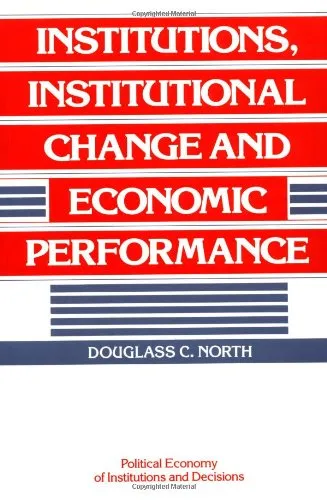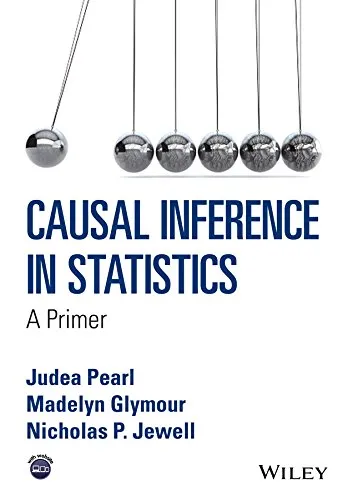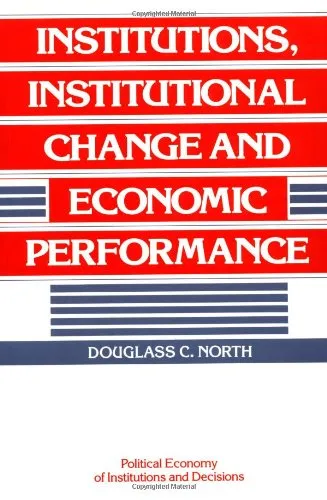Institutions, Institutional Change and Economic Performance (Political Economy of Institutions and Decisions)
4.6
بر اساس نظر کاربران

شما میتونید سوالاتتون در باره کتاب رو از هوش مصنوعیش بعد از ورود بپرسید
هر دانلود یا پرسش از هوش مصنوعی 2 امتیاز لازم دارد، برای بدست آوردن امتیاز رایگان، به صفحه ی راهنمای امتیازات سر بزنید و یک سری کار ارزشمند انجام بدینکتاب های مرتبط:
معرفی کتاب: Institutions, Institutional Change and Economic Performance
کتاب «Institutions, Institutional Change and Economic Performance» نوشته داگلاس سی. نورث، یکی از مهمترین آثار در حوزه اقتصاد نهادی است. این کتاب بررسیهای دقیق و نظریهپردازی قدرتمندی را در فهم چگونگی تأثیر مؤسسات و تغییرات نهادی بر عملکرد اقتصادی ارائه میدهد. نورث در این اثر به نقش حیاتی مؤسسات در ایجاد اقتصادهای کارآمد و پایدار میپردازد و نشان میدهد که چگونه تغییرات نهادی میتوانند مسیر رشد اقتصادی را بهبود بخشند یا مختل کنند.
خلاصهای از کتاب
در این کتاب، داگلاس نورث، مفهوم مؤسسات را بهعنوان قواعد بازی در جوامع انسانی تعریف میکند که شامل قوانین رسمی (مانند قوانین و مقررات) و هنجارهای غیررسمی (مانند سنتها و عرفها) است. نورث توضیح میدهد که این مؤسسات چگونه رفتارهای انسانی را شکل میدهند و مشکلات مربوط به «هزینههای مبادلاتی» (Transaction Costs) را کاهش میدهند.
کتاب به سه بخش اصلی تقسیم شده است. در بخش اول، نورث تاریخچهای مختصر از تحول اقتصادی جهان ارائه میدهد و نشان میدهد که چگونه مؤسسات در طول زمان تکامل یافتهاند. در بخش دوم، او به چگونگی تغییر مؤسسات و عواملی که باعث حفظ یا تغییر آنها میشوند میپردازد. سرانجام در بخش سوم، بررسی میکند که چگونه تغییرات نهادی میتوانند سرعت توسعه اقتصادی را تعیین کنند و چرا برخی کشورها رشد اقتصادی پایدار را تجربه میکنند، درحالیکه برخی دیگر در چرخهای از ناکارآمدی گرفتار میشوند.
نورث با استفاده از مفاهیم همچون Path Dependence و نقش Uncertainty، استدلال میکند که تغییرات اجتماعی و نهادی بهندرت ساده و خطی هستند. مسیر حرکت اقتصادی کشورها، نتیجه مستقیم پیچیدگی تغییرات نهادی و تعامل بین عوامل اقتصادی، سیاسی و اجتماعی است.
نکات کلیدی
- مؤسسات رسمی و غیررسمی تأثیر مستقیم بر هزینههای مبادله و عملکرد اقتصادی دارند.
- تغییرات نهادی غالباً حاصل ترکیب نیروهای سیاسی و اقتصادی است.
- Path Dependence نشاندهنده تأثیر ماندگار تصمیمات تاریخی بر اقتصاد آینده یک کشور است.
- نهادیسازی قوانین و کاهش Uncertainty نقش کلیدی در توسعه اقتصادی دارند.
نقلقولهای معروف از کتاب
“Institutions are the rules of the game in a society or, more formally, are the humanly devised constraints that shape human interaction.”
“Institutions reduce uncertainty by providing a structure to everyday life.”
“Economic change is overwhelmingly a process of continuous institutional change.”
چرا این کتاب اهمیت دارد؟
این کتاب، دیدگاهی جامع و علمی درباره چگونگی تأثیر مؤسسات بر توسعه اقتصادی ارائه میدهد. اهمیت آن در ارائه رویکردی بینرشتهای است که مؤسسات را نه فقط در مقام عوامل اقتصادی، بلکه بهعنوان نیروهای اجتماعی و سیاسی تحلیل میکند. دیدگاه نورث نشاندهنده آن است که توسعه اقتصادی با ایجاد تغییرات نهادی پایدار آغاز میشود. از اینرو، این کتاب یکی از منابع اصلی برای پژوهشگران، سیاستگذاران و کسانی است که به دنبال فهم عمیقتر از چگونگی تحقق رشد اقتصادی پایدار هستند.
همچنین، نورث به ما میآموزد که چرا برخی کشورها موفق به دستیابی به اقتصادهای پررونق شدهاند، درحالیکه دیگران همچنان با مشکلات ساختاری و نهادی دستوپنجه نرم میکنند. در دنیای پرتحولی که هرچه بیشتر بر مؤسسات و حکمرانی تأکید میشود، پیام این کتاب بیش از هر زمان دیگری مرتبط و مهم است.
Introduction to "Institutions, Institutional Change and Economic Performance"
"Institutions, Institutional Change and Economic Performance," written by Douglass C. North, is a groundbreaking work that delves into the role of institutions — the rules, norms, and constraints that structure human interaction — in shaping the course of economic development and societal progress. By offering a deeper understanding of how institutions evolve and influence economic performance, this book has become a cornerstone in the field of institutional economics and political economy.
North combines theoretical insights with rich historical examples to explain how formal and informal institutions emerge, adapt, or fail. He challenges traditional economic models that neglect the dynamic interplay between institutions and human behavior, emphasizing the importance of evolutionary and historical perspectives. This book represents not only a critical academic contribution but also a guide for policymakers, business leaders, and researchers seeking to comprehend the underlying mechanisms that drive economic success or stagnation.
In the sections below, we will explore a detailed summary of the book, key takeaways, notable quotes, and why this book holds relevance in today's world.
Detailed Book Summary
The fundamental assertion of the book is that institutions determine the transaction and production costs of an economy, which in turn shape its economic outcomes.
North categorizes institutions into two types: formal institutions, such as laws, contracts, and regulations, and informal institutions, like cultural norms, traditions, and conventions. These structures govern human interactions and reduce the uncertainty in economic activities. However, they are not fixed; institutions adapt in response to changes in economic, political, and social environments.
A significant portion of the book examines how institutional change occurs. North presents the idea that institutional evolution is a path-dependent process. This means that history and past decisions heavily influence the trajectory of institutional development. He also notes that while some institutional changes spur economic growth, others may lead to stagnation or decline. Analyzing historical cases such as the transition from feudalism to modern capitalism, he demonstrates how different societies have harnessed or failed to harness institutions to improve their economic performance.
North emphasizes the role of enforcement mechanisms in ensuring institutional effectiveness. For example, a set of formal rules (laws) is useless if there is no system to enforce those laws. Bridging this gap requires trust, cooperation, and social mechanisms that go beyond mere regulations.
Key Takeaways
- Institutions serve as the foundation upon which economic performance is built. They influence transaction costs, incentives, and economic behavior.
- Institutional change is path-dependent, shaped by historical developments and the unique contexts of each society.
- Effective institutions require a robust enforcement mechanism. Without proper enforcement and trust, formal rules lose their significance.
- Cultural and informal norms are as important as formal systems in shaping economic performance, often in ways that are hard to measure quantitatively.
- Economic theories must integrate historical and institutional analysis to better understand long-term economic performance.
Famous Quotes from the Book
"Institutions are the humanly devised constraints that structure human interaction. They are made up of formal constraints (e.g., rules, laws, constitutions), informal constraints (e.g., norms of behavior, conventions, and self-imposed codes of conduct), and their enforcement characteristics."
"The inability of societies to develop effective, low-cost enforcement of contracts is the most important source of both historical stagnation and contemporary underdevelopment in the Third World."
"Economic performance throughout history and in the present is largely determined by the kinds of institutions societies have established."
Why This Book Matters
Understanding the underlying role of institutions in economic performance is essential for addressing the world's most pressing challenges, from poverty to inequality to sustainable development.
North’s work equips scholars, policymakers, and readers with a framework to analyze and interpret why some nations prosper while others remain in cycles of poverty and underdevelopment. The book underscores that economic outcomes are not merely the result of individual decisions or market mechanisms but are deeply influenced by the institutional frameworks in place.
This book is particularly relevant in today's context, where institutional weaknesses and governance challenges persist. For nations tackling corruption, inefficiency, and socio-economic disparities, North’s insights provide practical and theoretical tools for driving meaningful progress.
By blending economic theory, historical context, and practical implications, "Institutions, Institutional Change and Economic Performance" sets the stage for a more nuanced understanding of why institutions matter in shaping the trajectory of human progress. The interdisciplinary approach of the book makes it a timeless resource for anyone seeking to explore the intersection of economics, politics, and society.
دانلود رایگان مستقیم
شما میتونید سوالاتتون در باره کتاب رو از هوش مصنوعیش بعد از ورود بپرسید
دسترسی به کتابها از طریق پلتفرمهای قانونی و کتابخانههای عمومی نه تنها از حقوق نویسندگان و ناشران حمایت میکند، بلکه به پایداری فرهنگ کتابخوانی نیز کمک میرساند. پیش از دانلود، لحظهای به بررسی این گزینهها فکر کنید.
این کتاب رو در پلتفرم های دیگه ببینید
WorldCat به شما کمک میکنه تا کتاب ها رو در کتابخانه های سراسر دنیا پیدا کنید
امتیازها، نظرات تخصصی و صحبت ها درباره کتاب را در Goodreads ببینید
کتابهای کمیاب یا دست دوم را در AbeBooks پیدا کنید و بخرید
1742
بازدید4.6
امتیاز0
نظر98%
رضایتنظرات:
4.6
بر اساس 0 نظر کاربران
Questions & Answers
Ask questions about this book or help others by answering
No questions yet. Be the first to ask!















